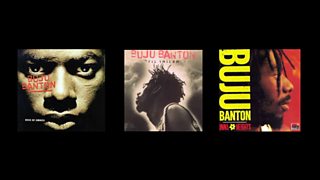"I just see myself as a servant" Buju Banton on his return
By Natalie D. Marshall, March 2020
With a career that has spanned over 30 years, Buju Banton is an icon of reggae and dancehall culture.
His musical highs - and personal lows – have been documented for all to see, and, in a very exclusive interview to conclude 1Xtra’s annual trip to Jamaica, the Gargamel sat down with Seani B to discuss his return. Below are four things we learned.

1 | There will be a new record come Summer
One thing Buju is clear about is his mission to push the culture forward and to increase the calibre of artists and music coming from within. That, coupled with his social programmes, Buju is continually using his platform to inspire and lead. One thing is for sure; new music. Partnering with Roc Nation, a new record is on the horizon for summer 2020: “The masses can get some new Buju and some new music inna their soul! Nothing less” promises the don.
The masses can get some new Buju and some new music inna their soul!Buju Banton
Talking of the music camp he has set up in his studio, Buju has his eye on nurturing the talent of up-and-coming artists.
"So much music is being made, but not being heard. Let us start getting the music out there with those who are capable of delivering and who are willing to listen"
But it comes with a price of being humble and willing as he concludes: “If you come with your glass full, there’s nothing we can put in it, but if it is half empty, you stand a chance.”
2 | How attitudes can drive change for the music business in Jamaica
On exploring the Jamaica that he has returned to late musically in 2018 following his incarceration on federal charges in the USA, Buju notes some of the changes.
We have to respect the business first and foremostBuju Banton
"Well, that’s a different kettle of fish. Because me see the Jamaica and my bredrin and my counterparts and they work earnestly and they work hard, but they not [being] given a break… some of it [is] due to their own fault, and their inability to advance themselves and the music and to recreate and to reinvent themselves and pump new life into the business and view the business as a business instead of a hustle – a whole load of things contribute to that.” He explains.
Further exploring the structures of the music industry in Jamaica and how the scene is on a worldwide stage and its growth, Gargamel says that attitudes have to change the structure of the music business: "We have to respect the business first and foremost and we have to respect the industry and treat it as an industry for it to grow".
3 | The UK has always had Buju's back
Exploring the relationship he has with his British fans, Buju reminisces about one of his first UK shows in the early 1990s at the Hammersmith Palais, west London.

“It was a beautiful night, I can remember clearly. I was wearing white!” muses Buju as he recounts his emotions on stepping out on stage. “I always have some great time in London with the people dem (sic); them love reggae music!”
At the time, the love that reggae dancehall ‘ragga’ culture got then was not from mainstream radio, but from the pirate radio, which gave them a closer connection to their fans.
As Banton’s career grew, so did his evolution from a hardcore dancehall artist to a more socially conscious one - which saw him, record more spiritual reggae albums, such as Voice of Jamaica (1993),‘Til Shiloh (1995), and Inna Heights (1997).
“The music started from a way from where it grew up from the dancehall, from the streets from the ghettos, come up and then you now transition slowly… My journey is my journey and the fans walk with me along the journey.”
4 | Why Buju never wants to be put on a pedestal
As well as numerous musical projects, Buju has released ten albums, including his Grammy Award-winning album, Before the Dawn (2010).
I'm just here to deliver some music to the masses...Buju Banton
While universally seen as the nearest thing to royalty in the culture, Gargamel doesn’t want to be held up too high: “I don’t want them to hold me up too high, because when they let up it’s a long fall!".
“I just see myself as a servant, gwan (sic) serve them some music right! I don’t too subscribe to the notion of ‘hold them up high’ because I don’t deal with hypocrisy, I’m just here to deliver some music to the masses, and if you like the music, you come, and if you don’t, you just leave it.”

